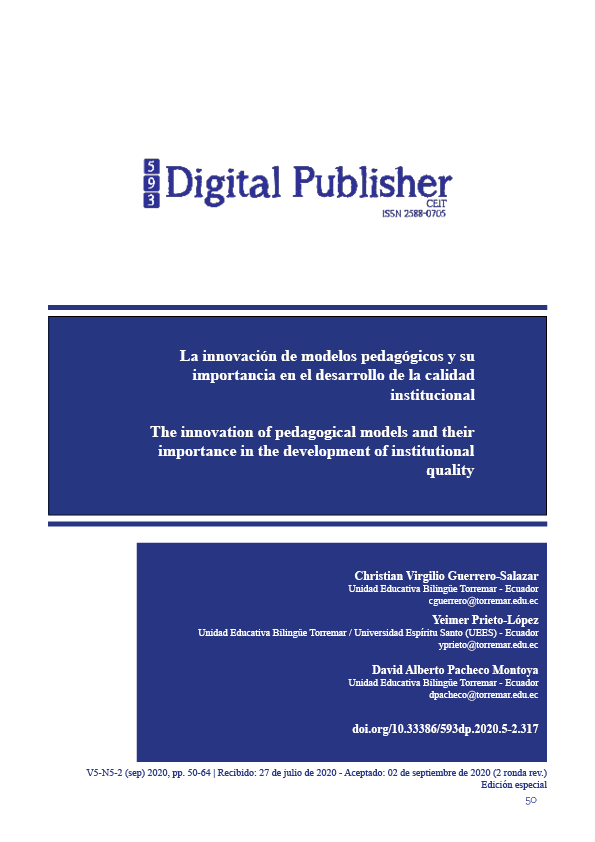The innovation of pedagogical models and their importance in the development of institutional quality
Main Article Content
Abstract
The present study raises the importance of the design of pedagogical models that, particularizing the real contexts of educational institutions, propose effective strategies of action for the fulfillment of the goals set in the development of institutional quality. The proposal is based on the experience of authors in different Ecuadorian institutions at the middle and upper levels, who have pioneered the design or adaptation of educational models to their respective realities, showing clear signs of improvement in the quality of education.
The project from which this article is derived is in the process of implementation, taking as a pilot institution the Torremar Bilingual Educational Unit and is conceived as a process of innovation that is framed in the recognition of a problem that affects the educational community: the lack of a clear methodological proposal that, based on the particular context, would further improve the academic development of its students.
The implementation is based mainly on the Teaching for Understanding model, adapting the fundamental principles that Gardner and Perkins gave to their proposal, without ruling out the subsequent integration of other models. According to its pedagogical research modality, it corresponds to an action research project, which seeks to establish and clarify the characteristics of the problem posed through qualitative techniques, such as in-depth and quantitative interviews, as surveys of teachers in order to assess their perceptions of the methodological proposal and establish continuous improvement processes.
The final product of the project will allow the establishment in the long term of a pedagogical model specific to the institution that prioritizes the best teaching techniques and methods, in line with the student reality, and to strengthen teaching practice in accordance with the didactic use of new technologies.
Downloads
Article Details
1. Derechos de autor
Las obras que se publican en 593 Digital Publisher CEIT están sujetas a los siguientes términos:
1.1. 593 Digital Publisher CEIT, conserva los derechos patrimoniales (copyright) de las obras publicadas, favorece y permite la reutilización de las mismas bajo la licencia Licencia Creative Commons 4.0 de Reconocimiento-NoComercial-CompartirIgual 4.0, por lo cual se pueden copiar, usar, difundir, transmitir y exponer públicamente, siempre que:
1.1.a. Se cite la autoría y fuente original de su publicación (revista, editorial, URL).
1.1.b. No se usen para fines comerciales u onerosos.
1.1.c. Se mencione la existencia y especificaciones de esta licencia de uso.
References
Acosta, A. (2007). Enseñanza para la comprensión. In FiPC (Ed.), Pedagógicos y Didácticas contemporáneas.
AFS Intercultural Programs. (2014). Ciclo de Aprendizaje Experiencial de Kolb. Intercultural, 1–3. https://woca.afs.org/education/m/icl-for-afs--friends/6512/download
Angelini, M. L., & García-Carbonell, A. (2015). Percepciones sobre la Integración de Modelos Pedagógicos en la Formación del Profesorado: La Simulación y Juego y El Flipped Classroom. Education in the Knowledge Society (EKS), 16(2), 16. https://doi.org/10.14201/eks20151621630
Barrios, L., & Chaves, M. (2016). El proyecto de Aula como estrategia didáctica en el marco del modelo pedagógico enseñanza para la comprensión. Avances En Educación y Humanidades, 1(1), 39–54.
Blanco, R. (2006). La escuela como centro de Innovación educativa. Unesco. https://cedoc.infd.edu.ar/upload/La_escuela_como_centro_de_innovacion.pdf
Blythe, T. (2002). La enseñanza para la comprensión-Guía del docente (1°). Paidós.
Bonder, G. (1994). Mujer y Educación en América Latina: hacia la igualdad de oportunidades. Revista Iberoamericana de Educación, 6.
Cifuentes, J. (2015). Enseñanza para la comprensión: Opción para mejorar la educación. 70–81.
Cifuentes, J. (2019). Aprendizaje del marco de la enseñanza para la comprensión en profesores: un abordaje desde las trayectorias de pensamiento. Revista Virtual Universidad Católica Del Norte, 5821, 3–23. https://doi.org/https://doi.org/10.35575/rvucn.n57a2
Ferrer, A. (2018). Propuestas pedagógicas disruptivas alrededor del mundo.
Gardner, H. (2016). El Proyecto Cero de Harvard: Una historia personal. 13(30), 16. https://doi.org/10.14311/NNW.2015.25.014
Hernández, R., Fernández, C., & Baptista, M. (2014). Metodología de la Investigación (6°).
Herrera, M. Á., & Cochancela, M. G. (2020). Aportes de las reformas curriculares a la educación obligatoria en el Ecuador. Revista Scientific, 5(15), 362–383. https://doi.org/10.29394/scientific.issn.2542-2987.2020.5.15.19.362-383
Maeyer, M. De. (2007). Aprender y comprender: visiones o divisiones. Una responsabilidad del Estado.
Ministerio de Educación del Ecuador. (2010). Educación e Innovación 2010 Encuentro Internacional Cuenca.
Salamanca, S. (2017). Enseñanza Para La Comprensión: Concepciones y Prácticas Pedagógicas. 56.
Stake, R. (1998). Investigación de estudio de casos.
Stone, M. (1999). La Enseñanza para la Comprensión.
UNESCO. (2016). Innovación educativa.
Universidad Casa Grande. (2012). Modelo pedagógico UCG: “Entender, Orientar Y Dirigir La Educación.” 1–21.




